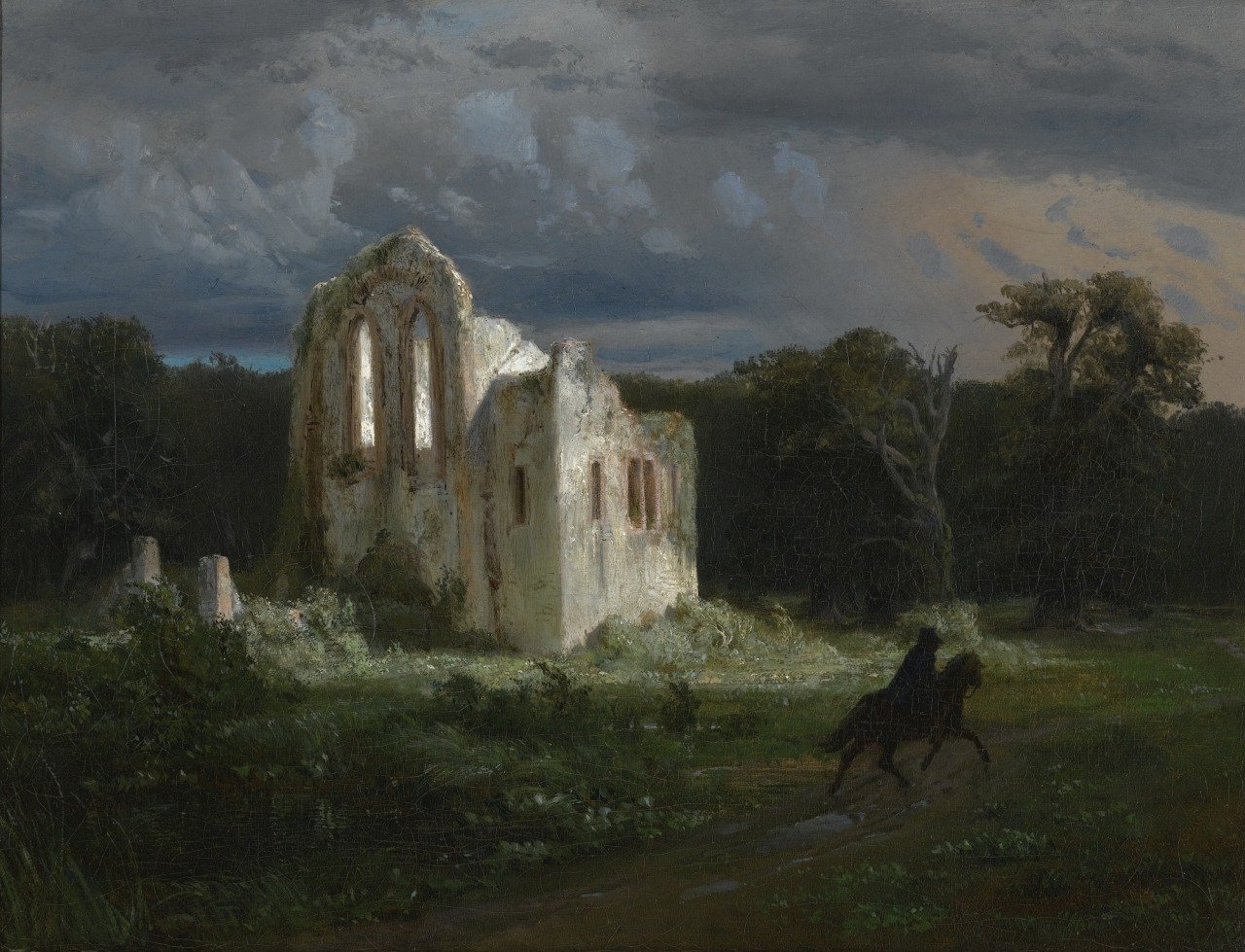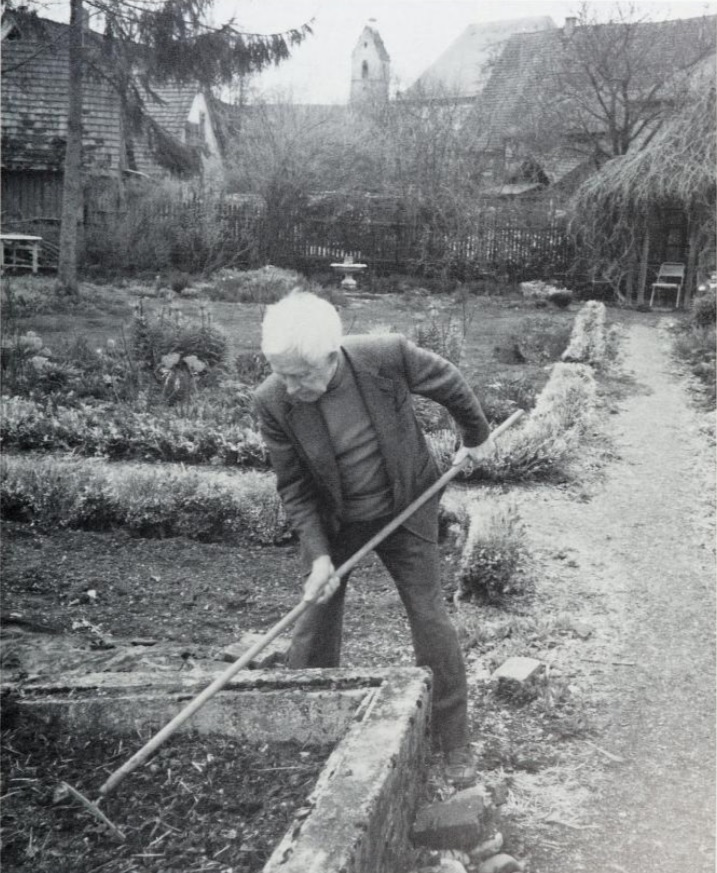From the original article on November 14, 2023. Authors: Ernst Jünger, Jünger Translation Project (translator).
First printed in 1959 in the “Frankfurter Allgemeinen Zeitung”.

With every autumn comes the angel of melancholy. One must sacrifice to it, not run away from it. It is a way of celebrating the mystery of death: even death should be a practice. Fruits ripen and are harvested, leaves change colour and fall. Crows gather in clouds and circle over bare fields. The days grow shorter, the night comes earlier; fire and light are rediscovered. It is a time of feasts for the dead, wanderings to the cemetery, and nightly visits from the gods. Dreams begin to change, manic features appear. The most secret time of the year comes, the rough nights, and the feasts of light. The light is guarded, it becomes the light of the caves, hidden and auspicious.
In the garden, the first night frosts have destroyed all the flowers: honeysuckle, dahlias, the last lilies, asters, blue bindweed, and colourful vetiver along the fence. Only the chrysanthemums continue to bloom, in full or in part, variegated, and also the late roses, often well into December. Footsteps rustle through the yellow foliage of hazel, the copper-coloured leaves of beech and the dark red of wild vine.
Thrushes, having had enough of the black elderberries, swoop in searching for red berries. They rush lawns to hunt for worms. Jays and woodpeckers fly from groves to orchards. The greenfinches are waking up, they stick to the little cones on the thuja. On the fence sits the first bullfinch. Soon its red plumage will shine out beautifully against the snow.
The flowers still to come have a double meaning: farewell and return. Among the late bloomers are the autumn blue crocus and the golden saffron crocus, the autumn crocus in its horticultural forms, which have only recently arrived from distant mountains: the Spanish Sierra, the High Atlas, the Taurus, and Lebanon. Some gardeners do not tolerate them in their beds: they remind them of the ephemeral, of graves, of the year coming to an end. The same cannot be said of witch hazel and delicate winter jasmine, which after a mild autumn are already forcing out their flowers. Sometimes they are joined by forsythia. Spring is already making its outposts within them. In the forest the snow lilies have grown light green tufts.
In a corner of his garden, the gardener is turning compost while mist drips from the branches. It smells musty, mildew covers the dead branches, the shovel raises bones from the crumbling earth. But the lilacs that shade the site in the summer have already begun to bloom, they are swelling with red. On the tree, runes inscribe a prophecy of a May miracle. The fig tree near the southern wall is already bearing fruit; the small resemble green buds, the large ones, sturdy clubs. They will survive the winter and swell in next year's sun, becoming sweet in September.

Even under the flower beds, everything is still stirring – and it is difficult to tell if it is spring or autumn. A shovel turns the soil and bulbs appear at the bottom of the bed. They already have eyes sticking out. The irises have green tops, and red crystals have formed on the nettle roots. All this delights the gardener and gives great pleasure and confidence. Now it will doze under the snow, in the humus, until it feels the February sun. Then it will stretch its limbs and come to life. Snowdrop, spring snowflake, and winter aconite are there. They are followed by crocus in colourful adornment, scilla, daffodil, and star magnolia. The blossom gives an idea of dreams of in the depths.
Skipping winter is one of nature's ingenious traits. There is something unexpected, something of a leap of the shoot in the advance it dares to make from the dark November soil. The heart of the world is about to beat out a new rhythm; countless hearts follow its time. Sprouts of tulips, lilies, and crown imperials pierce the surrounding cover like a festive gift. Just as a wagon wheel twists and turns around its unexpanding axis, regardless of its destination, so life here is organised around its innermost cell, its intangible core. It revolves in and of itself without intention; the beauty of the flower, the richness of the fruit, these are not the goal but the testimony. There is not only great boldness in this advance, but also confidence. Here is the certainty that the sun will return, that it will not forsake life. Deep down, doubts about this have never left us; they return every autumn.
Provisions are stored, floors and cellars are filled with fruit from fields and gardens, meat and wine. Voles, dormice, badgers, hamsters slumber in their burrows, having plugged the exits they feed on what they brought in during the summer. The dormouse rests in the loft of the barn and the marmot hibernates in the high mountains. Countless larvae wait in the mulch of trees, at the bottom of streams, under the snow covered meadows, in their pupal cradles like mummies. They are all equipped to survive the winter and then gather again for the great spring festival.
But behind all their endeavours there remains a doubt that only hope can calm. The gardener who holds a crocus bulb in his earth-covered hand in November is looking at a repository that was hoarded in the summer.. It has already attached itself to the soil with pale fibres, it has trusted the earth. Its security is there. But in the seed there shines confidence: the certainty that the earth will be broken through. It heralds the return of the light.
The grey month is a farewell to nature. With it comes mourning, funeral ceremonies, melancholy. But heralding powers also approach, a cheerfulness germinates, quieter and more furtive than that of the harvest festivals and grape harvests. The dead approach in dreams.
The great paradox, in which spring and winter, life and death are reversed, frightens and delights our hearts. Not only darkness grows, but also confidence. “Everything is against us,” as they say on Lake Constance. The first drums sound in Basel, karbatschen in Uberlingen, bells in Rottweil. “Against” does not only mean: towards February, when sap rises on the trees and foolish beings triumph. It also means: against the night – the daytime night that grows longer and darker, the night of winter that has barely begun, the night of death into which we are plunged along with nature.
When darkness falls, hope lights up. It stirs in all the buds, tops, and shoots of the dark earth, igniting them like candles in its light. This is followed by festivals of light.

Library of Chadnet | wiki.chadnet.org